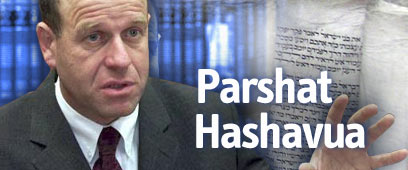

Was Abraham a better leader than Moses?
Photo: Reuters
Parshat Vayelech describes the last day of Moses' life. "I am 120 years old today. I can no longer go out and come in" (Deut: 31:2).
It is undoubtedly one of the saddest days in the Bible. In front of our eyes, fully aware of the present, the past and the future, Moses takes his leave. There is no joie d'vivre, no satisfaction at his coming entry to the next world.
Moses goes to his death cranky and grumbling. He cannot fathom how a generation that has experienced, first hand, so many wonders and miracles couldn't bring itself to reach the level of righteous, purity and total faith they were expected to attain.
He leaves this world with hard feelings of failure, feeling like the whole enterprise will collapse without him: "For I know that after my death you will in any wise deal corruptly, and turn aside from the way which I have commanded you; and evil will befall you in the end of days; because ye will do that which is evil in the sight of the Lord, to provoke Him through the work of your hands (Deut. 31:29).
Days, years have gone by. Was Moses' frustration appropriate as he bid farewell? In describing our people, he was painfully accurate, and not much has changed since.
Stiff-necked and stubborn
We are a rebellious nation, stiff-necked and stubborn; we carry the name of God but don't exactly act in accordance with His character traits and commandments.
On the other hand, Moses failed to find any opening to judge the people positively, and he provided ample ammunition to enemies bent on criticizing the Jews and our history. After all, it is impossible that such a large group, that has lived together for so many years, has no trace of goodness or merit.
After all, in the story of Sodom and Gemorrah, our forefather Abraham searched and searched for good, refusing to accept the possibility that there was simply no good there. How much more so must it be true for our nation!
If so, what is the basic difference between Abraham and Moses? Both spoke directly with God, both received promises; both changed and influenced God's heavenly court. One established our faith, the other our nation.
So why does Abraham leave the world "at a good old age, mature and content" (Gen. 25:8), while Moses takes leave of the Jewish people angry and complaining?
From Abraham to Moses
A simple reading of the biblical text shows that the main difference of these two mythological giants of our nation lies in their divergent understandings of the dramatic incidents in their lives, of their extraordinary nighttime prophecies, their conversations with God, covenants and promises.
Abraham was a man of history. He took the extraordinary events of his life as just that: extraordinary. The rest of his life happened according to the rules of nature. Slowly, day to day.
He did not expect that the people to share all his experiences. He created a slow, in-depth educational process, focusing on basics. Even God himself calls him, " For I have known him, to the end that he may command his children and his household after him, that they may keep the way of the LORD, to do righteousness and justice" (Gen. 18:19).
Abraham does not expect everything to come true in his generation. He begins the project, hopes his children will turn our stronger than he and will merit the fruits of his labor.
Moses: Drama, not process
Moses, on the other hand, is a great believer in the power of drama. He is a leader of great gestures, not slow process.
Perhaps his upbringing in Pharaoh's palace prepared him for great things, and created within Moses a near-total lack of sensitivity for the daily goings-on of normal, everyday people.
Abraham comes from simple beginnings to achieve greatness, whereas Moses is never willing to compromise one iota on his royal upbringing.
Moses thought his miracles were enough to convince the people to change. He couldn't internalize the message that 400 years of back-breaking slavery in Egypt created a stronger, lasting impression on the Jewish people than any once-off Godly miracle could, even one as impressive as Mount Sinai.
Moses was God's representative to the Jewish people, but Abraham was the nation's representative to God. Moses never connects with this word, whereas Abraham never severed his connection with it.
Therefore, Abraham leaves this world with a feeling of great satisfaction and accomplishment, but Moses is the polar opposite. Moses was the leader of a generation, but Abraham's leadership created a nation that would live for generations.
Rosh Hashana: Abraham's holiday
Perhaps this is the reason we read the final chapters of Moses' life on the Shabbats surrounding Rosh Hashana, but on the new year holiday itself, we read about the pinnacle of Abraham's life: his wife's pleas to God for a child and the near-binding of that child, Isaac.
It is worthwhile, then, to pay attention to the traditional prayers recited on Rosh Hashana. This is no day for the Jewish people to retreat into itself and to celebrate the nature of being God's chosen people.
Rather, it is a universal day of international solidarity, a day to celebrate the birthday of the world and the day that world became pregnant with possibility.
"Today all creatures will be judged," says the prayer book, and continues, "Remember all creatures that come before You, God."
Not only the circumcised or those who pray three times daily, but everyone. Everyone who comes to the house of prayer, a house that is open to all nations.
This is the holiday of Abraham, the great believer in humanity, not of Moses, who had trouble believing even in his own people.















